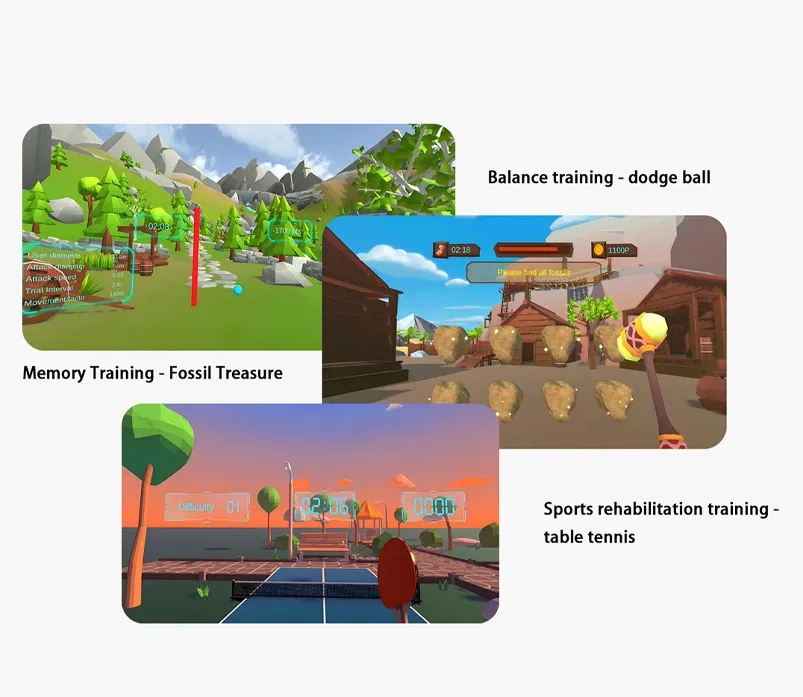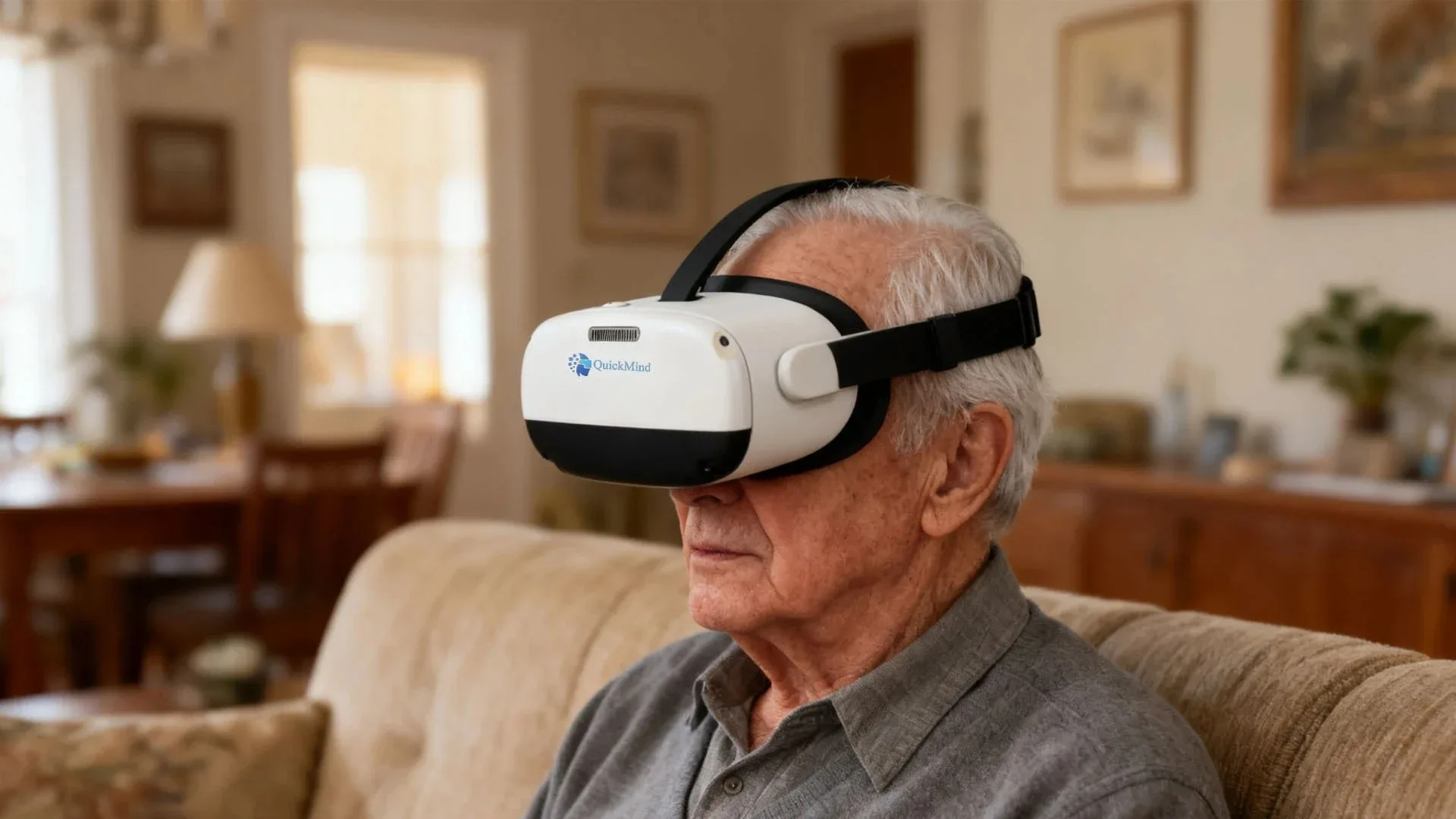
Progressive assessments suggests that interactive virtual spaces program can greatly improve the well-being of persons suffering from cognitive impairments. By transferring them to serene scenes, VR supplies a exceptional possibility for intellectual provocation, psychological balance, and interpersonal communication. Several research works have demonstrated that VR therapy can minimize excitability, nervousness, and sadness in dementia patients while also raising their retention, focus, and linguistic talents.
- VR provides participants with dementia to reminisce precious moments through collaborative illustrations.
- Furthermore, it can supply a secure and caring space for group interaction, developing a perception of affiliation and inclusion.
- Professionals believe that VR therapy has the capability to overhaul dementia care by delivering new and cutting-edge ways to confront the multifaceted complications faced by patients coping with this state.
Digital Therapeutics for Cognitive Enhancement in Alzheimer's Disease
Advancing virtual solutions are proving useful in the area of intellectual growth for clients struggling with Alzheimer's dementia. These interfaces make use of software solutions to activate brain operation and supposedly retard the spread of the illness. Gamified routines, personalized assistance, and neuropsychological training are some illustrations of approaches being considered in this developing domain. While experiments are happening, digital therapeutics present a complementary channel for bettering the lives of those experiencing Alzheimer's dementia.Exploring Virtual Worlds: Innovative Methods for Alzheimer's Care
In relation to people facing Alzheimer's dementia, the slow weakening of memory and intellectual capacities can substantially impact their capability to connect with the immediate surroundings. This crippling disease often brings about in remoteness, agitation, and a reduced self-recognition. Up-to-date breakthroughs in virtual reality technology show a cutting-edge means to resolve these obstacles by formulating immersive experiences that can ignite the brain and revive cognitive function.
Digital immersive sceneries configured specifically for Alzheimer's sufferers can carry them in known venues, such as their early residence or a admired outdoor area, triggering positive memories and decreasing anxiety. Through interactive exercises, these virtual universes can also challenge cognitive abilities like mind retention, focus, and problem-solving.
The likely improvements of virtual reality in Alzheimer's healing are substantial. Early investigations have demonstrated beneficial results, with persons demonstrating improvements in cognitive function, mood, and overall quality of life. As this tool evolves, it holds the key to transforming the way we approach Alzheimer's disease, delivering a new pathway for management and motivation.
Virtual Recollection Therapy for Alzheimer's
Reminiscence therapy is a broadly accepted technique used to increase cognitive function and quality of life in individuals with Alzheimer's disease. This customary form of therapy involves engaging patients to share past experiences, often through narratives. However, a radical approach is emerging: VR-mediated reminiscence therapy.
This immersive tool utilizes virtual reality headsets to place patients in lifelike environments that recall memories from their past. By reliving these computer-generated environments, individuals with Alzheimer's can bond with their past in a noteworthy way.
Virtual Reality as a Memory and Cognitive Booster in Dementia
Virtual reality (VR) is emerging as a aspiring mechanism in the fight against dementia, supplying advanced ways to boost memory and cognition. By crafting immersive scenarios, VR can support individuals with dementia access memories, interact in meaningful activities, and strengthen cognitive aptitudes. Studies have proved that VR interventions can cause measurable improvements in memory recall, attention, and cognitive awareness. Moreover, VR provides a comfortable and inviting space for individuals with dementia to share, reducing feelings of isolation and stress.
- Likewise, VR can be modified to individual needs and preferences, facilitating greater levels of collaboration.
- Notwithstanding the potential of VR, extended research is needed to fully understand its long-term effectiveness in dementia care.
Renewing Memories, Enhancing Relationships: VR for Alzheimer's Social Health
Digital synthetic settings is emerging as a revolutionary technology in the branch of Alzheimer syndrome. By developing interactive and responsive realities, VR has the potential to awaken memories, cultivate social interaction, and increase the overall quality of life for individuals diagnosed with Alzheimer's. Among the most notable aspects of VR is its ability to relocate users to classic places and moments from their past. Whether it's a visit to a childhood home or a representation of a beloved holiday, these virtual journeys can evoke happy memories and reinforce cognitive skills. Furthermore, VR can support social interaction by linking individuals with others who share similar backgrounds. This can be particularly advantageous for people with Alzheimer's who may experience challenges with traditional social participation. By offering Cognitive Rehabilitation a safe and stimulating virtual space, VR can mitigate feelings of isolation and loneliness, which are common among participants experiencing Alzheimer's. Overall, VR holds immense likelihood for reshaping the lives of persons with Alzheimer's by rekindling memories, recovering connections, and upgrading their quality of life. As technology proceeds to progress, we can expect even more advanced applications of VR in the field of dementia care.Exploiting Cognitive Training: Applying VR to Alleviate Alzheimer's Symptoms
Artificial reality platforms is rapidly emerging as a game-changing tool in the realm of cognitive training, particularly for persons managing Alzheimer's disease. By immersing patients in interactive and engaging virtual environments, VR-based interventions can stimulate cognitive functions such as memory, attention, and problem-solving. These games usually incorporate elements of storytelling, exploration, and social interaction, making the training process highly engaging. Studies have shown that VR-based cognitive training can lead to pronounced improvements in cognitive performance, possibly delaying the progression of Alzheimer's symptoms. Moreover, VR provides a safe and controlled environment for patients to practice new skills and cultivate their confidence.
- Game elements in VR training can make it deeply absorbing and pleasant for users with cognitive difficulties.
- VR simulations can offer convincing scenarios that challenge and stimulate cognitive functions.
- Personalized VR experiences can cater to particular desires and modalities.
Harnessing Virtual Settings for Dementia Relief
Mesmerizing replicated spaces offer a novel and promising avenue for subjects undergoing dementia. These tools can emulate familiar environments, allowing those affected by cognitive decline to recollect cherished memories and cultivate a sense of security. By tackling the effects of dementia, VR scenarios have the potential to refine quality of life for both individuals and their caregivers.
- Assessments indicate that VR techniques can substantially impact cognitive function, social well-being, and even motor abilities in individuals with dementia.
- Moreover, VR furnishes a safe and supervised environment for interaction, reducing the risk of harm.
- Also, VR can encourage social interactions by allowing individuals with dementia to socialize in digital activities with others.
Virtual Reality for Prompt Alzheimer's Screening and Intervention
Alzheimer's condition constitutes a complicated puzzle, often going undetected in its early stages. Still, virtual reality (VR) is gaining traction as a state-of-the-art tool for identifying the disease at an early stage. Through immersive platforms, VR can appraise cognitive abilities in ways that traditional methods are inadequate to. This promise allows for early treatment strategies, potentially retarding disease progression and upgrading the quality of life for users with Alzheimer's.
- Virtual reality evaluations provide cognition, focus, and orientation testing within secure and managed environments.
- Tailored VR programs enable patients to partake in mental activation tasks.
- Interactive virtual contexts enable socialization and interaction for Alzheimer's patients.
Closing the Divide: VR for Communicative and Interactive Dementia Support
{In the realm of dementia care, innovative technologies are emerging to boost the lives of subjects facing dementia challenges. Virtual reality (VR) is one such platform that holds immense capacity for fostering communication and interaction improvements in dementia via VR. By creating immersive and engaging virtual environments, VR can energize cognitive function, reduce behavioral issues, and ultimately improve the overall well-being of users in dementia care.
VR experiences designed for neurodegenerative disease management can range from memory therapy sessions that take clients to known past settings, to interactive games that promote social interaction and cognitive practice. Furthermore, VR has the capacity to connect persons managing dementia with social groups, regardless of physical barriers, fostering a sense of solidarity.
- VR can aid in reducing agitation and anxiety by providing a calming and enthralling environment.
- Research have shown that VR interventions can lead to improvements in cognitive function, mood, and social interaction in dementia patients.
- As technology expands in evolve, we can expect even more innovative and {effective|beneficial|helpful|powerful|impactful|successful|productive|efficient
